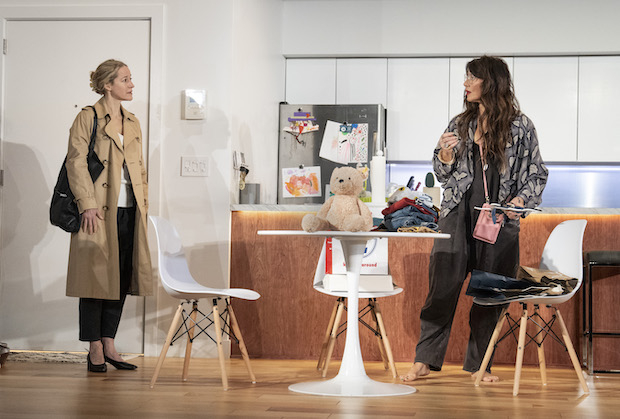Review: Lucy is a Rich Mom's Libel Against the Working Class

(© Joan Marcus)
There's no final exam for having children. Parents will not receive a diploma when their kid turns 18. Your successes and failures will mostly remain a subject to be discussed with therapists and the occupants of adjacent barstools long after you are dead. This is something the professional class struggles to grasp. America's ambitious meritocrats, secure in their God-given right to have it all, often attempt to apply to parenting the tactics that have afforded them career success; and it is the job of children, like malevolent Greek deities, to humble them in their efforts. This is the truly fascinating story rumbling beneath Erica Schmidt's wonky domestic thriller, Lucy, now making its world premiere with Audible at the Minetta Lane Theatre. It's a pity that the playwright doesn't seem to recognize it.
The play opens in the New York City apartment (scenic designer Amy Rubin has created a spacious and tidy kitchen-cum-living room) occupied by Mary (Brooke Bloom) and her six-year-old daughter, Lucy (Charlotte Surak). Mary is a single mom who works as a radiologist at a prestigious hospital. She's also very pregnant with her second child. That's why she has scheduled an interview with Ashling (Lynn Collins), a career nanny with 40 years of experience.
Mary is clear about her expectations for this salaried position. "I typically work 40-50 hours. Which means you would work 50-60 hours to allow me time to get to and from work; plus the one weekend a month." Ashling takes the job, even though she is hesitant about the hours. She's enthusiastic about working with a baby again, as the children of her current employer are now older. Unlike the incumbent, Mary does not live in a townhouse with a major domo and a nanny for each child. We are meant to understand her as a member of the squeezed middle class, even though as a Manhattan radiologist she almost certainly earns over $500,000 a year. Anyone who is not a longstanding member of the one percent will instantly sniff the hill of bullshit on which this drama is constructed.
That ultimately undermines our sympathy for Mary as Ashling's stellar resumé gives way to the unforgivable reality that she is a flawed human being. Mary dislikes how she can smell Ashling's perfume on the baby when she returns home; she is frustrated that Ashling cannot seem to get Lucy to adhere to her strict 8pm bedtime; and she seems positively flabbergasted when Ashling purchases Lucy an unauthorized teddy bear. "It's about expectations and spoiling her and creating a precedent in your relationship," Mary explain, like a contract lawyer going into negotiation (with a six-year-old). When Ashling shows up an hour late to work, and only after multiple calls, it's the last straw.

(© Joan Marcus)
If none of these infractions seem particularly egregious to you, this is all part of Schmidt's construction. We bristle at Mary's uptightness: her habit of scrubbing dishes before she puts them in the dishwasher; her constantly-on-edge personality; her need to micromanage everything. But, over the course of one hour and 40 minutes, we're meant to come around to her side and realize that Ashling has been gaslighting her all along, to use a fashionable cliché.
Both actors work overtime to make this journey happen. Collins is loopy and disingenuously effusive. "Them's the perks of being me," she says multiple times, like an annoying '90s sitcom character attempting to coin a catchphrase. Obsequious to Mary's face, she often disobeys her orders when she is away (surely, you've never done that when you know there's a better way to do your job than how your manager thinks it should be done). Ashling is a manipulator, no doubt, but who wouldn't be tempted to fudge when faced with such exquisite neurosis?
Bloom spares nothing in bringing Mary to life, her shoulders ever tensing under her business casual maternity wear (hilarious costumes by Kaye Voyce). Her sharp gaze darts from one end of the apartment to the next, threatening to vaporize all in its path. "She could turn out to be a really annoying person if I don't stay on top of it," she says of her daughter, never once considering that her helicopter parenting may be the very thing turning Lucy into an insufferable brat. She radiates paranoia about the little people out to fleece her (a point underlined by the apparent conspiracy between Ashling and the doorman). Her habitually weary expression says it all.

(© Joan Marcus)
A better director might have noticed all this and pushed Schmidt to challenge her own assumptions and contrivances. Unfortunately, Schmidt has chosen (as she did with Mac Beth and Cyrano) to direct her own work. The result is a play that takes far too long to reach its inevitable conclusion, further weighed down by clunky musical scene transitions.
Sound designer Justin Ellington delivers some delightful lullaby covers of pop songs, heavy on glockenspiel and whimsy. But even he cannot lighten Schmidt's most heavy-handed flourish, an extended dance between Ashling and Lucy to Taylor Swift's "Anti-Hero" ("It's me, hi, I'm the problem, it's me.")
Despite its domestic setting, it's hard not to view Lucy as fundamentally a story about the conflict between labor and management — with the playwright coming down firmly on the side of the latter. Schmidt attempts to distract us from her deeply polemical final scene by having the actors throw things at each other. It's amusing in a Mommie Dearest sort of way, but it illuminates nothing except the violent rage simmering beneath bourgeois manners, especially when they learn that they cannot actually have it all.











